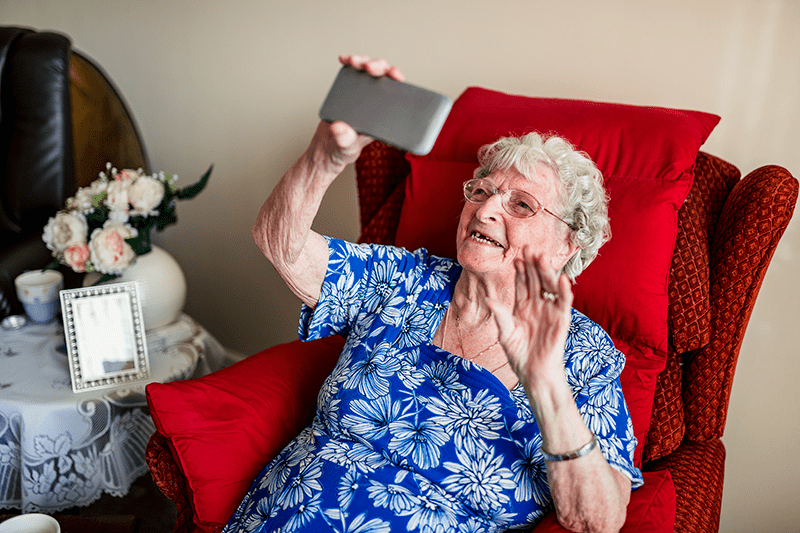Keeping Connected and Keeping Elderly Loved Ones Safe When You Can’t Visit
For many of us, keeping our older loved ones safe in the time of coronavirus can mean keeping our distance. Whether your loved one lives in their own home or an assisted living or nursing facility, it can be difficult. So how do you keep connected to the seniors in your life when you can’t physically be there, and how do you ensure their safety when you can’t stop in to check in on things?
Call—a lot. Check in frequently to keep that connection:
- Use technology if possible. Facetime, video calling, Skype and Zoom are some options.
- Set aside a specific time to connect every day so you and your loved one have something to look forward to. You can make a date to call every morning at 9 a.m. or right after lunch or dinner, for example.
- Consider doing something special during your calls—sing a few favorite songs together, play family trivia, or read a chapter from a favorite book every night.
- If your loved one is in a senior living facility and has Alzheimer’s, memory loss or other issues that prevent them from using the phone on their own, see if there is an employee in the facility who might be able to facilitate a phone call. Even if your loved one is non-verbal and can’t actively participate in the conversation, they will take comfort in hearing a familiar voice.
Ask questions and listen carefully for any concerns:
- Ask them how they are feeling. Listen for signs that they are not feeling their best either mentally or physically.
- If they live alone, do they have enough of what they need? Food? Medication? Toiletries? (If not, shopping for supplies and leaving them on their porch or outside their apartment door may be an option. Governor Whitmer’s Stay Home/Stay Safe Order does allow you to shop for essentials and travel to care for a relative.)
- If they are living in a senior living facility, ask:
- How has their routine has changed?
- What processes or procedures is the facility using to keep everyone safe? Do they have any concerns about how the facility is handling things?
Remind them about the importance of social distancing:
- Talk to them about the ways they can change their routine to keep a safe distance from others.
- Help them problem-solve if needed. (Maybe calling friends instead of going down the hall to visit or connecting to televised or streamed worship services)
Find other ways to connect:
- Send a card or a letter. A letter or card they can look at and read again is a wonderful way to help them feel connected.
- If possible, do a sidewalk visit. Make a fun sign or sing a special song. Make sure you stay at least six feet apart from your loved one and that you understand the rules if they are living in a senior apartment, nursing home or other senior living facility.
Some tips to ensure they’re safe if they’re in a senior living facility that you can’t visit:
- Ask the facility about the protocols they’re using to keep everyone safe. How they are getting residents the things they need? What is their emergency plan if residents become ill? How are meals being delivered if residents are quarantined in their apartments or rooms? Are staff wearing Personal Protective Equipment (PPE)?
- Know whom you can contact at the facility if you have concerns.
- Find an ally among the care staff at the facility who might be able to provide updates on how your loved one is doing.
- If your loved one is in a licensed facility–like a nursing home–concerns can be addressed with the state’s long-term care ombudsman: 1-866-485-9393.
Remember that the Stay Home/Stay Safe Order does allow people caring for a loved one to travel to that loved one’s home to care for them.
- If you must go to your loved one’s home to deliver care, do all you can to keep yourself safe. Keeping yourself from getting COVID-19 is the best way to prevent passing on the disease to your loved one. See the CDC website for more information on prevention.
- Have an emergency plan that you can enact if you should become ill or have been exposed and need to isolate. This may involve having a sibling come in if you cannot, moving your loved one to another relative’s home temporarily or moving your loved one to a senior facility temporarily.
More resources for seniors and their families during the coronavirus outbreak
For more information on AgeWays’s response to coronavirus, visit our coronavirus response and resources page. This page includes updates on our operations and services during the coronavirus outbreak. It also includes resources for seniors and family caregivers, including food assistance, stores with senior hours, and resources to help with isolation.
